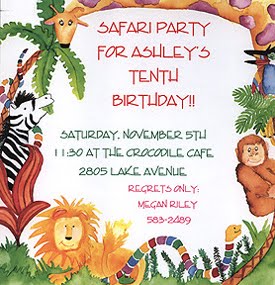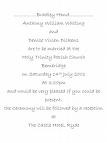| Preposition | Time | Place |
| In | Year, Month, In 1999, In December | Country, State, City In Japan, In Utah, InTaipei |
| On | Day, Date On Saturday, On May 1 | Street On Main Street, On 1st Ave. |
| At | Time At 8:00, At 7:30 | Address At 815 East Main Street |
In many languages, there is only one preposition for the above situations. In English there are three. Just remember that in usually indicates the "largest" time or place, and at usually indicates the "smallest" time or place. Examples:
- A: Where's your office? B: In Taipei, Taiwan. A: Really? What part of Taipei? B: It's on Chung Shan North Road. A: I know that area. Where exactly is it? B: It's at 105 Chung Shan North Road, next to the bookstore. C: When is the wedding? D: It's in June. C: What day? D: It's on Saturday, the 25th. C: What time? D: It starts at 6:00.
Prepositions with articles and locations
When talking about locations, use at to indicate the general vicinity or area, and in to
indicate inside the building, enclosed area, etc. For example:
| at the swimming pool (on site) | in the swimming pool (in the pool itself i.e. in the water) |
| at the post office/bank (general) | in the post office/bank (inside the building) |
| at the zoo (visitors, general area) | in the zoo (animals in their cages) |
| at school | in the classroom |
- I met my wife at the theater. (while watching a movie) I spilled my drink in the theater (on the floor of the building) She works at the library on Wednesdays. She found a rare coin in the library (building). Dr. Jones works at the hospital every day. John was in the hospital for a week with a broken leg.
the general situation. Note the following:
| "practice"/situation | building |
| in school (studying, listening to teacher, etc.) | in the school (building) |
| in jail/prison (staying there as a criminal) | in the jail/prison (temporary) |
| in church (praying, listening to a sermon, etc.) | in the church (building) |
| in church (attending services) | in the church (fixing the windows) |
| at church | at the church |
| in prison (He committed a crime.) | at the prison (visiting his friend) |
| For Practice: See | At-On-In Used in Time and Dates (from The Internet TESL Journal) Prepositions: At, In and On (from The Internet TESL Journal) |
See also: Grammar: Prepositions and Time Words;Prepositions of Location
If you have questions or comments about this page, please contact us.
Be sure to include the title of this page in the Subject line of your e-mail.







 18.58
18.58
 Windrian Epelan 17 e-primbon
Windrian Epelan 17 e-primbon



 Subscribe
Subscribe Follow me!
Follow me!
